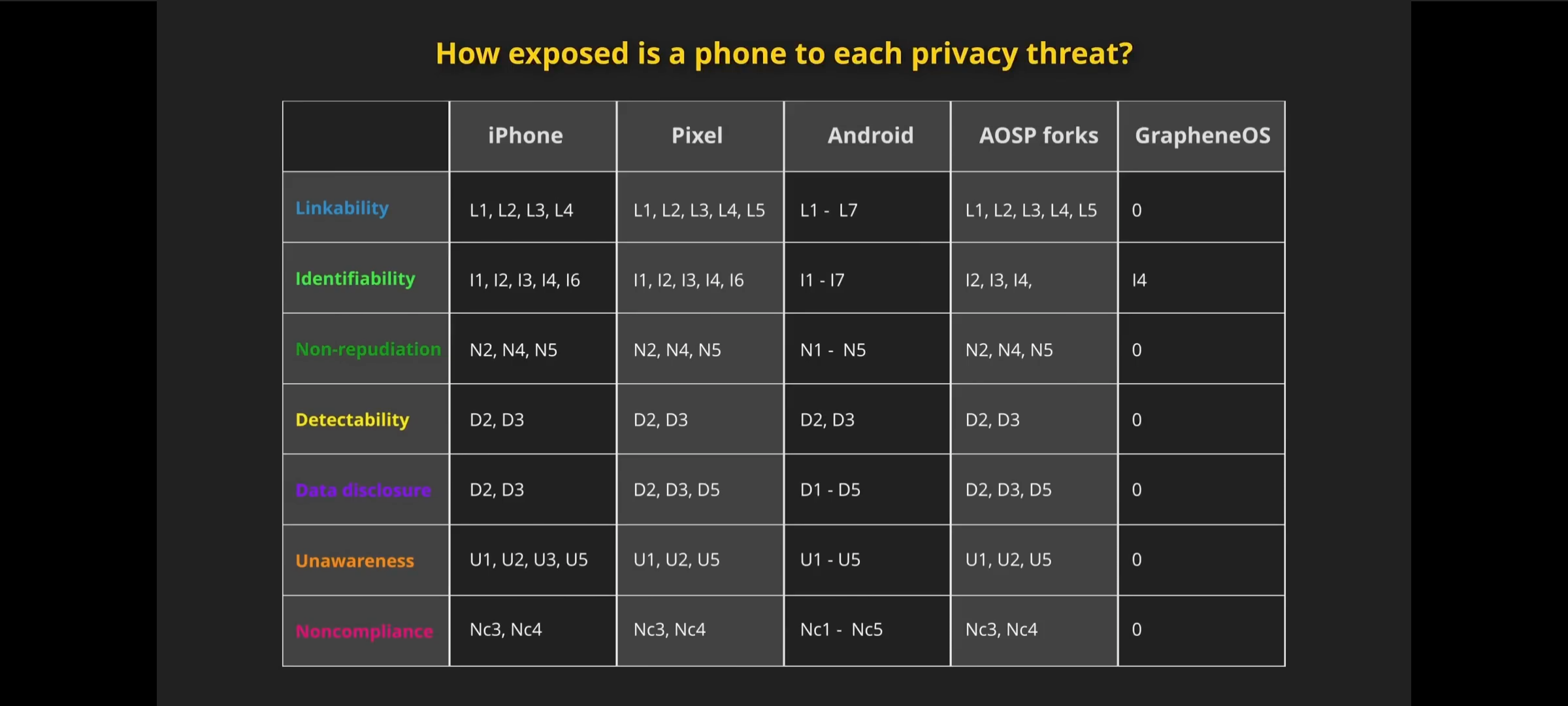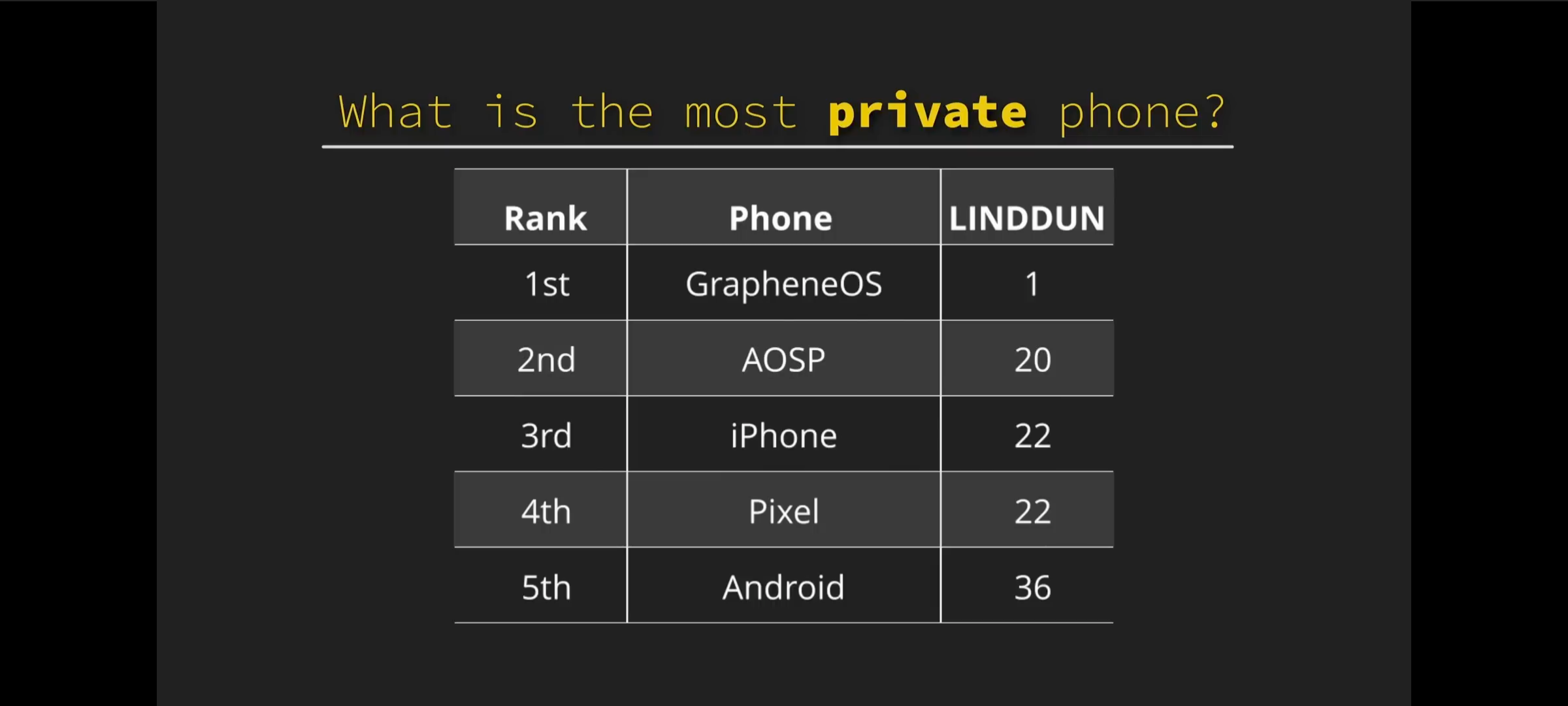- cross-posted to:
- [email protected]
- cross-posted to:
- [email protected]
TL;DW


LINDDUN card deck PDF for reference: https://downloads.linddun.org/linddun-go/default/v240118/go.pdf
TL;DR: Out of iPhone, Pixel, Android, AOSP forks, and GrapheneOS, the answer is GrapheneOS by a country mile.
Actually good point, added a TLDW screenshot of the summary
GrapheneOS sometimes sacrifices privacy for security.
I had way more privacy related features and controls on a rooted LineageOS phone (which was obviously much less secure)
Please elaborate and/or [Citation needed].
This is incorrect. It strengthens both privacy and security in a lot of ways for an average user.
share your data with bad actors to prevent bad actors from getting your data
Which of these smart phones lets me have a headphone jack… ’cause that is how I will choose. I can patch software & be wary about how I use the device, but I can’t just add I/O to the hardware. Until the Pixel brings back the jack, it is dead to me.
I got a Nokia XR20 because of this. Also waterproof and rugged. A phone that needs a case to survive the hairless monkeys dropping it is a design failure and completely unacceptable.
Just wish I could use proper software with it.
I didn’t watch the video but I don’t think there is any phone that lets you avoid having your location tracked. If there is wifi near where you want to use the phone, you could run a voip client on on a wifi-only tablet, perhaps.
I’ve been wondering whether satellite communications gizmos with no GPS allow any type of precise location tracking from the satellite. I’ve been interested in this, which lets you exchange text messages at fairly low cost (about 2 cents per 50 byte unit). Besides possible privacy advantages, it also lets you communicate where there is cell coverage:
Added a TLDW summary to the post if you want to take a peek
Ok but wifi only isn’t really a phone?
Can you call on wifi? Yes (voip numbers like you said). I think that’s a phone.
Obviously you need to be connected
Then my laptop is a phone? It’s sort of a phone but it doesn’t connect to the phone network, so only sort of. Since it needs a wifi signal it’s not so mobile either.
Well technically there is: pixel + graphene os + airplane mode with wifi only, from the video
Spoiler: It’s a banana phone.
What is LINDDUN?
I agree with this. However the very latest Pixels (with the stock ROM) might be a bit more invasive than the phones by an OEM like Motorola or Nokia.
Usually I tend to avoid sarcastic responses, but since no one mentioned it, how about the game of Telephone?
A flame of xylophone?
I actually don’t agree with this video; and firmly believe it is more than a little biased.
For example, the Pixel, AOSP and Android are given several undeserved points due to lack of proper information or understanding of how certain features work. I imagine this is the case too for the iPhone; if a bit less so.
The review apparently doesn’t deep dive into settings or attempt to maximize privacy by turning off unwanted ‘features’ when settings switches are available to the user; nor does it assume that you set up accounts in as private of a manner as reasonably possible or toggle off as many default-on consent switches as needed.
While I would support scoring and dinging each case or instance for “Privacy Settings that don’t actually work”…this video really doesn’t do a lot of legwork and leans on the anecdotal evidence of scary news stories too much.
Worse was the fact that the entire video felt like they were shilling for Graphene OS; which is known to have a slightly unfriendly maintainer and community surrounding him to say the least.
No mention of Lineage or other privacy oriented Android ROMs were analyzed. AOSP too, was unfairly lumped in and dinged for specific points of the Default Pixel configuration…and yes there are major differences between AOSP and Pixel Android; even though Google tries to be less in-your-face invasive than the other OEMs. Not enough credit is given for the “On-Device” smart features implemented properly on the Pixels.
Out of personal experience; I’d actually rate a proper Lineage OS install of 4 whole Android versions ago to be more private than stock. Not quite as private as Graphene; but not quite as invasive and much more enforcing of privacy. The debloating provided by a clean AOSP-like ROM, such as Lineage, as opposed to a “Stock Android” configuration from a major OEM is stark.
Most importantly I personally feel that the privacy model chosen for the video is far too thickly detailed for an average person. Most of the privacy concerns listed on each card contained concern points that might only tangentally apply or don’t apply at all to mobile phones. The way that each card was scored and applied felt low effort. None of the points on any of the card(s) were weighted with average users in mind.
I really hope someone goes into a much deeper dive; this video is basically clickbait that parrots the commonly parroted advice in the privacy community; which isn’t even good advice, it’s just ‘One-Size-Fits-All’ style advice which gives the user no room to make necessary ‘Privacy vs Convenience’ tradeoffs that they themselves could have made if they understood proper threat modelling.
I’d actually rate a proper Lineage OS install of 4 whole Android versions ago to be more private than stock.
Its always the lineageos stans that can’t take the truth.
Would a research paper change your mind?
https://infosec.exchange/@rene_mobile/113431029855652363
According to this table, Google Pixels beat other devices listed there by far. Even Samsung S-series doesn’t look good
What about a security expert?
Overall, LineageOS does not leave a privacy-friendly or truly secure impression






